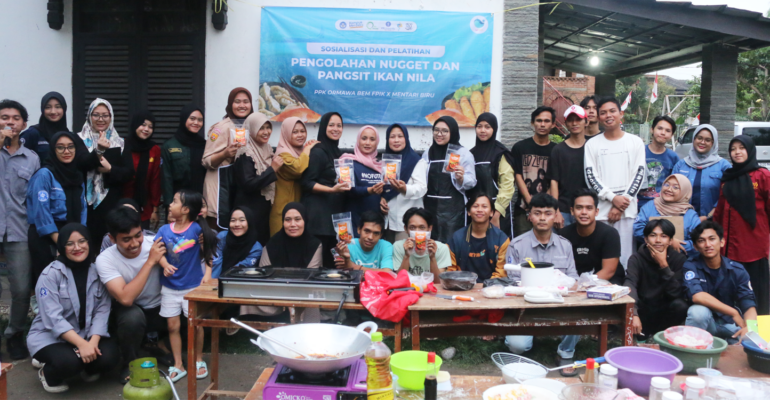Reviving SMEs in Ciampea Udik Village, FPIK IPB University Students Trains Tilapia Fish Nugget and Dumpling Making

The Student Organization Capacity Strengthening Program (PPK Ormawa) team, students of the Faculty of Fisheries and Marine Science (FPIK) IPB University, successfully conducted training on tilapia-based product processing in Ciampea Udik Village, Bogor Regency, West Java.
The training was attended by 20 participants, consisting of youth and local village mothers, with the aim of improving skills and knowledge in processing tilapia into high-value products.
One of the PPK Ormawa FPIK IPB University team, Akmaludin, explained that the training began with a theoretical session that discussed the importance of diversifying processed fish products in increasing selling value and competitiveness in the market. Furthermore, participants were taught the correct tilapia fillet technique, which is the basic step in product processing.
“Instructors from the PPK Ormawa team of FPIK IPB University provided practical guidance and hands-on demonstrations on how to separate fish meat from bones with effective and hygienic methods,” he said.
After the fillet session, the training continued with the making of tilapia nuggets and dumplings. Participants were guided from the ingredient preparation stage, dough making, to the frying and packaging process. In this session, participants also received tips and tricks to create crispy and delicious nuggets and dumplings, as well as information on food hygiene and safety standards that must be met.
“This activity aims to empower the people of Ciampea Udik Village by providing skills that can be developed into small and medium enterprises (SMEs). Through this training, it is hoped that participants can utilize the local potential of tilapia as a source of additional income, as well as open new business opportunities in the field of food processing,” he said.
Akmaludin also expressed his appreciation to the participants who were very enthusiastic in participating in this training. “We hope this training will not only provide technical skills, but also motivate the participants to innovate in creating processed fish products that can compete in the market,” he said.
This training is part of a series of community service programs carried out by FPIK IPB University students, with a focus on empowering village communities through sustainable development of local potential. This activity is expected to have a long-term positive impact on the economy of Ciampea Udik Village residents. (*/Rz) (IAAS/Hap)



















